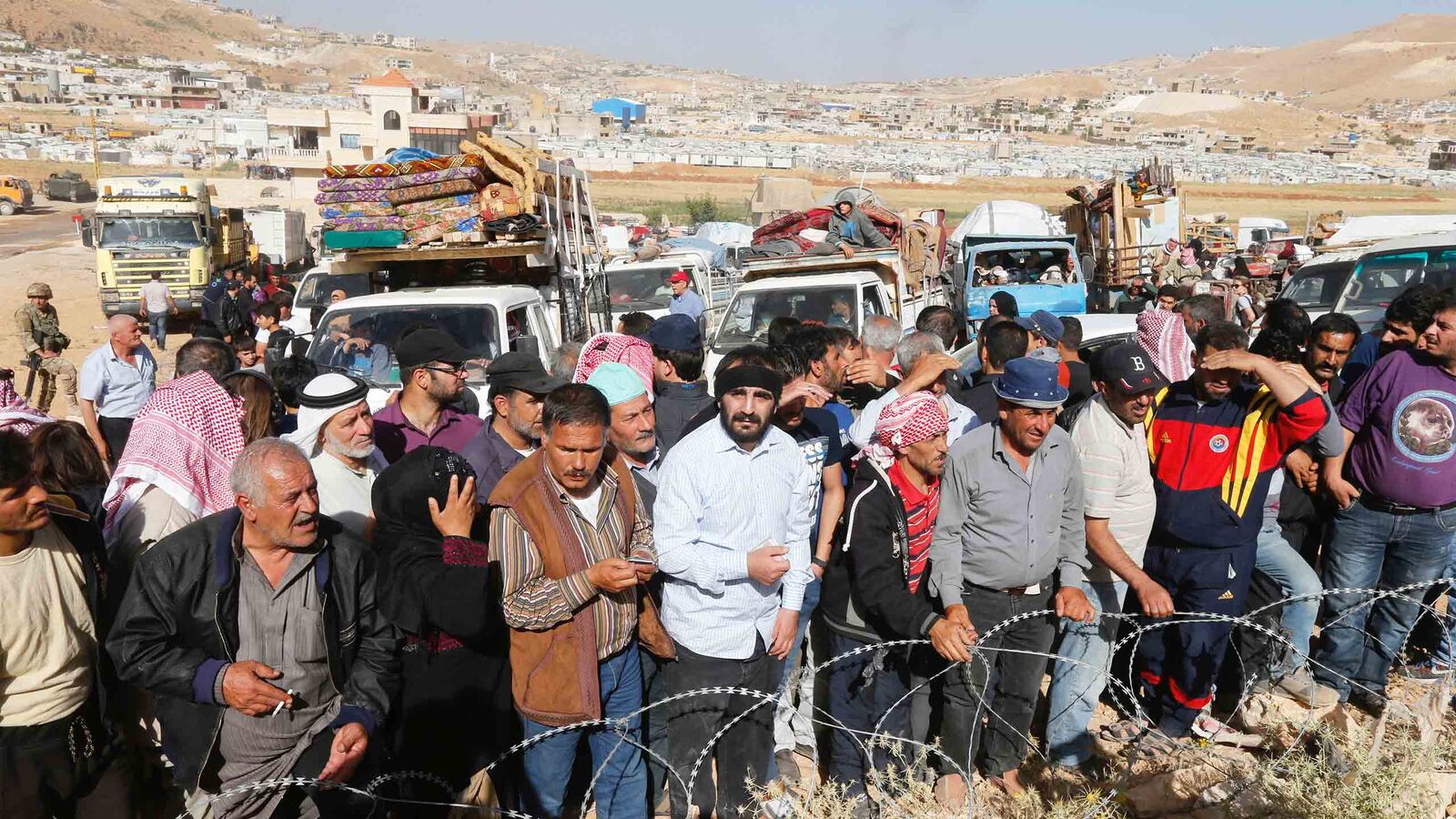ARSAL, Lebanon—The atmosphere is hectic at the military checkpoint here. Hundreds of Syrian refugees are gathering just as the sun starts to lighten the horizon. Soldiers in the Lebanese Armed Forces (LAF) are everywhere, standing guard as dozens of families who had just been told the day before that they were to leave strap their meager belongings to vehicles and prepare for the journey back to Syria, a country they fled years ago in the wake of a revolution-turned-bloodbath.
As the morning passes and the sun rises higher in the sky, the Red Cross has its hands full with the heat-stricken. One medic with a fainting infant in his arms quickly strides through the giant barbed-wire enclosure to an ambulance. The hours continue to drag on into the afternoon. Children become restless and start crying. Grandmothers ache and adjust damp hijabs. Despite the uncomfortable temperature and delay, very few refugees seem to be complaining—but these people are no strangers to waiting.
Asked how they feel about the trip, many Syrians seem nervous and aren’t forthcoming with their responses—at least, not within earshot of the LAF soldiers. One well-coiffed Lebanese TV journalist shoves a microphone into the face of a Syrian boy who looks about six years old. “Are you excited to be going home?” she asks repeatedly. He hides behind his mother’s leg, crying. “Why aren’t you excited?” she insists. “You should be excited.”
When refugees do respond to such questions, some answers seem rehearsed. “We are very happy to be going home,” one middle-aged woman says, her eyes on the ground. “The Lebanese have been good to us.” A short distance away from the crowd, a grizzled man in his sixties wearing a checkered keffiyeh starts to say something similar. "Of course I’m happy," he begins through clenched teeth. "One is always happy to go back to his home."
His voice suddenly breaks. He turns his face away, his eyes brimming with tears. "I’m hoping I will find my house still standing when I get there, but we don’t know anything about what we’re going back to,” he says with despair. “Only God knows. If we die, we die, but it’s better than staying here."
Then suddenly, the exodus begins. Trucks, vans, buses and cars pull out of the barbed-wire lot, swaying with all the possessions their owners managed to retain after fleeing a war and living in squalor for several years in a largely unfriendly land. Now they are finally going back to their country – or whatever is left of it after seven years of almost unceasing conflict.
Dozens of Lebanese soldiers mill around, shouting and waving them past. One elderly man perched atop an enormous, ancient tractor loaded with mattresses and suitcases is pulled aside for some final pointless examination and humiliation. Then over 400 of them are gone, their vehicles swallowed by dust.
But approximately 4,000 people had put their names forward to be considered for this group of returns. Most gather their things and head back to their sunbaked tents or half-finished rooms in disappointment to wait for next time.
These gatherings are part of what are as yet small-scale returns of refugees from Lebanon to Syria, organized by some Lebanese authorities with the Syrian regime, which has been amping up the rhetoric calling them home in recent months.
It now seems clear that Syrian President Bashar Assad, who just retook the city of Daraa, the last major rebel-held stronghold and birthplace of the ill-fated Syrian revolution, will maintain control over much of the country, and he is eager to demonstrate that his victory is complete enough for refugees to return to areas now firmly in his hands.
The return of refugees is a symbol useful to the Russians as well, showing they have helped to bring a kind of peace. If U.S. President Donald Trump cuts a deal with Russian President Vladimir Putin, as many expect, the U.S. would abandon America’s erstwhile allies in Syria to whatever fate Assad has in store for them. But if refugees are returning to the country, that could be used to argue the security situation is not that bad.
Assad’s wishes for refugee returns have not fallen on deaf ears in Lebanon. There is a growing call among some of the Lebanese political parties aligned with the regime to send Syrian refugees back to the country they fled. On Thursday, Gebran Bassil, Lebanon’s Minister of Foreign Affairs and leader of the Free Patriotic Movement (FPM), one of a plethora of parties fighting over leadership of the country, announced that the FPM will be opening a committee to facilitate the return of refugees to Syria.
“Our basic case is the preservation of [Lebanese] identity,” Bassil said in the announcement. “We don’t want what happened with the Palestinians to happen with the Syrians.”
After the creation of the state of Israel in 1948, millions of displaced Palestinians fled to Lebanon. Around 500,000 are currently still living in atrocious humanitarian conditions in refugee camps throughout the country, where they are not allowed to work legally and experience much discrimination and harassment. The Syrian war chased somewhere around two million additional refugees into Lebanon, but nobody knows the exact number of Syrians who still remain. The Lebanese government asked the UN Refugee Agency (UNHCR) to stop registering refugees there in 2015.
The crisis has provided fuel for a rising tide of anti-refugee rhetoric among politicians like Bassil, who argue that a tiny country of only six million can no longer support such a large population of displaced people.
It’s true that the Lebanese economy has been teetering on the brink of disaster for years—but so have the precarious, constantly shifting political and sectarian alliances that barely prop up the government. An influx of Syrians has also led to increased spending in rural areas as well as plenty of aid from humanitarian organizations, so how much of the country’s troubled economy can be laid at the refugees’ door is unclear.
While Syrians are certainly straining Lebanese infrastructure, Lebanon prohibits the establishment of permanent camps, so the bulk of responsibility for housing and services throughout the crisis has gone to the UNHCR. The U.N. High Commissioner for Refugees logo can be seen on sun-bleached tents in countless refugee camps across the country. It has been providing housing, schooling, food supplies, medical care and other humanitarian aid to Syrians for seven years now, not just in Lebanon, but Turkey and Jordan, which are struggling to cope with their own refugee crises. But the UN’s coffers are not bottomless. In May, the international organization announced that a “critical gap” in funding for Syrian refugees and host communities would lead to significant cuts in vital services. Dialysis care for Syrian refugees in Lebanon already is at risk of being defunded and more cuts seem imminent.
Given how desperate circumstances for these people are becoming in host countries neighboring Syria, UNHCR is warning of a possible repeat mass migration of the type experienced in 2015, when more than a million refugees fled to Europe after funding cuts. That crisis prompted countless refugees to hire smugglers to transport them to Europe in boats, a perilous and difficult journey that received a brief spurt of attention following the viral photo of three-year-old Alan Kurdi’s frail little body washed up on a beach. Since that image went viral, over 8,500 Syrians have died trying to cross the Mediterranean, their deaths largely unnoticed.
But any refugees brave or desperate enough to choose that route will find the environment waiting for them has changed dramatically since 2015. In June, the European Union officially backed the policy of Italy’s populist government and condemned rescue boats attempting to pick up refugees drowning at sea, part of an overall hardline shift in Western rhetoric and policy towards the Syrian crisis.
European countries as well as Canada are rapidly decreasing the number of refugees granted asylum. The United States under the Trump administration has taken in just under 50 refugees since last October. This leaves overwhelmed countries like Lebanon to shoulder the burden of such a large population, leading to economic instability and xenophobic resentment, which is sparking heated political rhetoric to send them back.
NGOs providing aid to refugees in Lebanon have argued that conditions in Syria aren’t safe enough for them to return, not just because there is still ongoing fighting there, but also a result of the regime’s brutality. There have been growing reports that Syrians returning to the country are being imprisoned, tortured and killed, which fits an overall pattern of regime-sponsored atrocities before and during the war.
“We're not yet at a point where you can have large-scale organized returns, simply because the conditions aren't there,” says Bassam Khawaja, Lebanon researcher at Human Rights Watch. “Certainly there's still ongoing generalized violence, but also we've been documenting [for a long time] evidence of mass torture by the Syrian regime, of targeting civilians, of mass detention programs. We’re seeing lists leaked of large numbers of people who are wanted by the regime and so in that situation it's very hard to make an argument that Syria's actually safe for people to go back.”
It’s also extremely unclear whether returned refugees will even have homes to live in upon their return. Huge areas of Syria have been ravaged by bombardment over the course of seven years, and if their houses or apartments are by some chance still intact, refugees face an incredibly uncertain process of trying to claim them.
In April, the Syrian government passed a law that demanded displaced Syrians come to reclaim their homes in person by early May or risk forfeiting them to the state, a measure widely seen as an attempt to shift demographics in the regime’s favor. Most of the refugees are Sunni, while the Assad government is Alawite, so there appears to be a sectarian element to these legal maneuverings. Critics say it is a thinly veiled attempt to strip Assad’s political opponents of their assets and repopulate crucial areas with his loyalists.
“Many of the refugees who fled the country have lost their papers, including ownership documentations for their properties,” says Alaa Barri, a researcher at Chatham House, a London-based think tank. “Law 10 seizes properties of those who are unable to prove their right; thus those who have returned recently from Lebanon might be at risk of being internally displaced…. These laws come as part of a regime series of actions to demographically and geographically change certain areas, [allowing] the regime to confiscate properties of millions of Syrians, redistribute them to its own supporters and assure control over high-value lands.”
The recent returns from Arsal were negotiated with certain vague and rather disturbing terms. The regime first demands that refugees coming back into the country be questioned and processed by Syrian intelligence. Most men under 45 years of age are being forcibly conscripted into the Syrian army, regardless of whether they already served before they fled.
Upon arriving in Syria, the refugees are to be greeted by the regime army, which takes them immediately to their local municipalities to pay fees for all utilities they should have paid during the years they were gone. Then they are meant to go through a confusing process of trying to claim and register their houses or apartments, which is especially precarious given the law passed in April.
But for many Syrians, their trepidation at what awaits them in Syria is outweighed by the misery of their lives in Lebanon. At a camp in Arsal, Khaled, whose name has been changed because he fears persecution by the regime, sits cross-legged in a small concrete room with blankets lining the floor. The brawny 36-year-old former truck driver put his name on the list to be considered for a return to Syria, despite knowing that he will certainly be conscripted into the army when he arrives. That would leave his wife and three daughters alone to brave dangers like the shabiha, notorious pro-Assad gangs renowned for sexual violence who are said to be terrorizing refugees upon their return.
“If I want to live here, I cannot work,” Khaled says. His eyes are red-rimmed and exhausted. “I am imprisoned in this tent. I cannot do anything. I can barely feed my children. These are unbearable conditions. Nobody can live like that. I cannot get a secure return to Syria, but what can I do? This is a living nightmare. I still do not understand how I ended up in this situation. It feels like a dream.”
Khaled says he fled Syria when his house was hit by heavy bombardment. He’s been living in Arsal for five years, enduring what he says is sustained harassment and persecution of the refugee population by local residents of Arsal.
“There was a 15-year-old [Syrian] kid who was not all there,” Khaled says, gesturing at his head in a way that makes it clear the boy was mentally challenged in some way. Men from Arsal “accused him of stealing, hanged him on an electricity pole, put gasoline on him and burned him. That incident was four months ago. Many have been burned here.”
To make matters worse, Khaled’s brother was just arrested at a checkpoint and jailed for what Khaled says was a meaningless text on his phone that raised suspicions of officers at a checkpoint. That has left his four nieces to live in one small room with Khaled, his three daughters, wife and mother.
“I have nine women. If we go back to Syria, how will I take care of them when they put me in the army?” Khaled says, a note of desperation in his voice. “And because we fled our country, the regime will probably put me right at the front of the battle. But I would prefer war to living in Lebanon. I would willingly die to keep what’s left of my pride.”
While the Lebanese government has taken great pains to label recent returns as “voluntary,” many experts say there is a gray area regarding that term. While the situation for Syrians in Lebanon has been dire for years, it has become even more difficult in recent months. Arbitrary arrests and detentions of Syrians are on the rise. Private landlords across Lebanon have recently been raising rents for refugees and with the help of local municipalities, carry out mass evictions of camps when they can’t pay. In fact, the camp that Khaled lives in is on the verge of being demolished and hundreds of Syrians living there evicted if they can’t gather together $4,000 among them by the end of the month.
A woman there named Souad wearing a black hijab and more than a hint of steel in her smile says pressure has been mounting on the refugees to leave.
“Last week they wanted to destroy four of our camps here in Arsal, but the Minister of Interior Security stalled it,” she says. “They want us to leave those walled rooms to be transferred to tents. We cannot live in tents, in the winter they will be flooded. That’s part of the pressure being put on us.“
“You have these really strict policies that make it extremely hard for Syrian refugees to actually stay in the country,” says Dima Mahdi, a researcher studying the Syrian refugee crisis for the Lebanese Center for Policy Studies, an independent political think tank in Beirut. “And municipalities are not held accountable by the government for curfews or evictions.”
That might be because the Lebanese government itself is not in agreement over what to do with the refugees. Ever divided on matters of policy, the state does not seem to have a coherent approach to these returns.
Powerful groups like the FPM and Hezbollah, the Iran-backed Lebanese Shia militia fighting in Syria on behalf of Assad, are campaigning for and facilitating the return of refugees to Syria. But others in the government aligned with Prime Minister Saad Hariri, such as Mouin Merehbi, the Minister for Refugee Affairs, say conditions are not adequate to secure the safety of returned refugees.
“The government is not unified on this issue,” says Merehbi. “We are trying our best. Even the things that [Foreign Minister] Gebran Bassil is saying represent only himself… This is not humane. This is not ethical. It is like bringing the victims to their killers. This man [Assad] is killing his people in the worst ways possible. Is it not a joke to say that now we want to deal with this murderous regime? We don’t accept dealing with this criminal. Whoever says this takes full responsibility on himself but not on behalf of the Lebanese government.”
But despite the opposition of politicians like Merehbi, the government doesn’t appear to have any plan to stop future returns, which are scheduled to continue. Given the lack of any move towards an adequate response to this crisis from the international community, it seems likely that the push to return refugees to Syria in Lebanon will only grow in strength—leaving refugees like Souad with few choices. At the camp in Arsal, Souad’s smile falters as she discusses what she’s hearing about the refugees who were recently returned.
“Nobody knows what is happening in Syria,” she says. “I heard that they took some men to the army, and other men went missing the moment they returned… I personally don’t want to go back. I don’t have a house there anymore and it is not safe for me. If the returns become involuntary in the future, only God can help us.”






